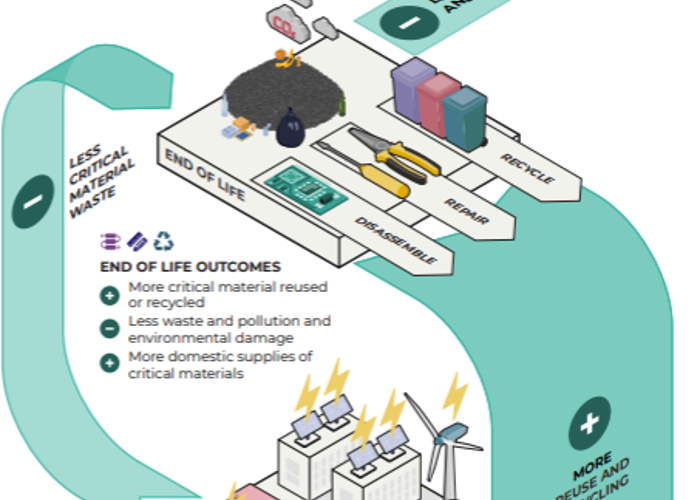Key findings of the report
This report provides an overview of the underutilised policy options for achieving reductions in demands for critical materials and dependency on imports of scarce materials.
It presents a range of policy and engineering interventions around three main areas of demand-side resource management. These include: infrastructure and technology planning, design and design skills and circular economy.
The report concludes with 25 recommendations for policymakers which will help the UK cut its critical material footprint. Lead recommendations from the report call for: an integrated materials strategy, a National Materials Data Hub, infrastructure planning for material sustainability, and a new target to halve the UK's material footprint.
The report also makes specific recommendations for targeted action, such as committing to the ban on single-use vapes, and improving repair and recycling of electronics to reduce e-waste.
Without intervention, the UK risks not achieving its Net Zero strategy and exposure to future economic uncertainty.

Aerial view of lithium fields in the Atacama desert in Chile, South America. Credit: Shutterstock.
What are critical materials, how are they used and why do they matter?
The UK government identifies materials such as lithium, magnesium, indium, cobalt, and niobium, as well as rare earth elements such as neodymium and praseodymium as critical.
These have a wide range of uses, for example in electric vehicle batteries, wind turbines, data centres and digital consumer items like telephones and computers.
What makes a material critical?
Materials are named as 'critical' when their anticipated uses go beyond the expected available supplies. Often these supplies are limited because:
- they are less valuable by-products of other mining activities
- their trade may be particularly subject to geopolitics due to geographical concentration
- they are difficult and environmentally damaging to extract.
The UK is economically and physically dependent on many of these critical materials. Recent supply chain crises have driven increasing concern about the growing need for critical materials. Vulnerability to supply chain crises is not only an economic threat but also challenges the capacity of the UK to achieve the infrastructure transformation required to reach net zero. Expansion of demand for critical materials also comes with environmental and social harms associated with their extraction and processing that would work against global goals of mitigating climate change and of a just transition to net zero. These impacts are often not visible to the public or decision-makers.
Watch the launch event
The Academy held a launch event for the report in November of 2024. Hear the new report’s findings, discover a case study on offshore wind, and enjoy a panel discussion hosted by Professor Mark Miodownik FREng and featuring:
- Professor Joan Cordiner FREng FRSE FIChemE, Professor of Process Engineering and Head of School of Chimical, Materials and Biological Engineering, University of Sheffield
- Dr Charlotte Stamper, Energy Infrastructure Lead at European Metals Recycling
- Libby Peake, Head of Resources Policy. Green Alliance
- Dr Colin Church FIMMM, CEO, Institute of Materials, Minerals and Mining.
Recommendations for policymakers
The report presents a range of proactive policy and engineering innovations around three areas of demand-side resource management:
- Infrastructure and technology planning: considering material requirements during the upstream planning of future energy, transport and digital systems.
- Design and design skills: design changes that minimise or eliminate the need for critical materials and the requisite design skills and cultures that enable this.
- Circular economy: ensuring that where such materials are used, they can be recovered and reused or recycled.
The 25 recommendations in this report aimed at UK government are complex and far-reaching, with implications for many policy areas. A summary of the mix of recommendations is detailed below.
- Develop an integrated materials strategy.
- Target halving the UK’s material footprint.
- Establish a National Materials Data Hub.
- Achieve the 15% whole-system energy demand reduction target.
- Transform UK engineering skills to emphasise resource efficiency.
- Incorporate assessment of critical material demands and resulting risks into energy policy.
- Include critical-material demand reduction as a goal of transport planning.
- Review policy options and standards for minimising critical material demands in data centre planning.
- Expand existing ecodesign regulations, as well as monitoring and enforcement capacity.
- Invest in UK and international capacity for recycling critical material intensive products.
- Support accelerated development of key alternative technologies.
- Identify strategic areas where the production of standards and innovation. guardrails would accelerate innovation and adoption of goods, products and infrastructure assets that use less critical materials.
- Commit to implementing the ban on single-use vapes in England.
Conclusions
Strategic policymaking for sustainable materials consumption across infrastructure planning and engineering design has been lacking in the UK.
Replacing fossil-fuel-powered infrastructure and technologies is a crucial and deliberate shift requiring sustained pace and scale of deployment normally reserved for acute crises such as the COVID-19 pandemic. It will require a new policy approach to materials in order to assure the decarbonisation process as well as the sustainability of the new infrastructure.
We hope the recommendations within this report can provide guidance for how the UK can develop an integrated materials strategy to reduce demand, and increase reuse and recycling of critical materials to support the UK’s existing Net Zero Strategy and improve economic security.
Acknowledgements
The report has been developed by the Royal Academy of Engineering and partners in the National Engineering Policy Centre (NEPC). The Royal Academy of Engineering expresses particular thanks to the Institute of Materials, Minerals and Mining (IOM3) and Institution of Chemical Engineers (IChemE).
The project was delivered by a National Engineering Policy Centre Working Group made up of the following experts:
- Professor Joan Cordiner FREng FRSE FIChemE (Chair)
- Tim Chapman FREng
- Dr Colin Church FIMMM
- Dr Mike Cook FREng
- Mark Enzer OBE FREng
- Professor Eileen Harkin-Jones OBE FREng FIAE FIMechE
- Professor Mark Jolly FIMMM
- Professor Rebecca Lunn MBE FREng FRSE FICE
- Dr Charlotte Stamper
- Rachel Stonehouse
- Melissa Zanocco OBE


Related content
Policy priorities for the next UK parliament: Engineering a resilient and prosperous future
Explore our report representing the views of the engineering profession, calling for a long-term approach to the big ch…
Enabling a decarbonised electricity system
Explore the NEPC (National Engineering Policy Centre) programme on decarbonising electricity in Great Britain.
Safety and ethics of autonomous systems
Exploring how autonomous systems should be designed, developed and deployed to ensure widespread benefits.
Critical capabilities
Effective responses to a national emergency requires the ability to call on and rapidly deploy critical capabilities: t…

